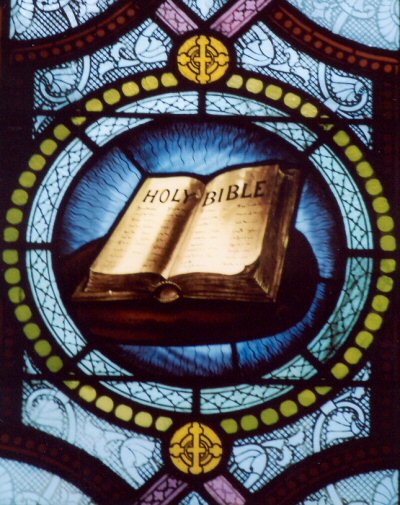
Liturgy of the Word
Fifth Sunday of Easter
May 22, 2011 Cycle A
White priestly vestments symbolize purity and integrity of the
life of faith.
Home Page
Liturgical
Cycles A 10-11
Introductory Acts Of Worship
The Entrance Prayers:
On Sunday, usually a hymn praising God
is sung in place of reciting a Psalm from the Bible which invites us to
enter more deeply into the mystery of God's love for us. The recited
weekday Psalm expresses a youthful heart and spirit, delighted that we may come
before the living God.
Entrance Song
/ Entrance Psalm (Antiphon)
Entrance Song
Psalm 97:1-2 Sing to the Lord a new
song, for he has done marvelous deeds; he has revealed to the nations his saving
power, alleluia.
The Priest Approaches and Kisses the Altar: The altar is a symbol of Christ. In it are cut five crosses to recall the five wounds of Christ. The altar also represents the Church and has embedded in it the relics of her saints. The priest comes to the altar to celebrate the Sacrifice in the Church's name. Because of the glory surrounding the altar upon which the divine Sacrifice will be made, the kiss of the priest unites the Church to Christ, its Redeemer.
Priest:
In the name of the Father, and of the Son, and of the Holy Spirit.
All:
Amen.
The Greeting: We are welcomed in God's name. Our response unites us to our neighbor, to the priest and to God. (The priest may select from several forms of greeting).
Priest: The Lord
be with you.
All:
And also with you.
The Penitential Prayers:
We recognize our guilt for past sins,
express our sorrow for them, and ask that Mary, the angels, the saints, and our
brothers and sisters in Christ pray for the Lord God's mercy. (The priest
may select from several forms).
Priest: As we prepare to celebrate the
mystery of Christ's love, let us acknowledge our failures and ask the Lord for
pardon and strength.
All: I
confess to almighty God, and to you, my brothers and sisters, that I have sinned
through my own fault in my thoughts and in my words, in what I have done, and in
what I have failed to do; and I ask blessed Mary, ever virgin, all the angels
and saints, and you, my brothers and sisters, to pray for me to the Lord our
God.
The Absolution:
Priest: May almighty God have
mercy on us, forgive us our sins, and bring us to everlasting life.
All:
Amen.
The Gloria: The Glory of God prayers have existed from the second century. They repeat the angels praise of God which heralded the birth of Christ on earth. Our praise is lifted again through the years as we rejoice at His coming as Lord, God, the most high Jesus Christ, who at Christmas took on our human nature while at the same time being the son of Man. This ancient hymn expresses our recognition of God's glory and love. It calls upon Christ as our holy and divine mediator, and the Holy Spirit who forever binds us together in God's love.
Priest and All: Glory to God in the highest, and peace to his people on earth. Lord God, heavenly King, almighty God and Father, we worship you, we give you thinks, we praise you for your glory. Lord Jesus Christ, only son of the Father, Lord God, Lamb of God, you take away the sins of the world: have mercy on us; you are seated at the right hand of the Father: receive our prayer. For you alone are the Holy One, you alone are the Lord, you alone are the Most High, Jesus Christ, with the Holy Spirit, in the glory of God the Father. Amen.
The Opening Prayer: The priest lifts the united prayers and petitions of the congregation to God the Father through the merits of Jesus Christ in the Holy Spirit.
Priest: God our Father, look upon us with love. You redeem us
and make us your children in Christ. Give us true freedom and bring us to
the inheritance you promised. We ask this through our Lord Jesus Christ,
your Son, who lives and reigns with you and the Holy Spirit, one God, for ever
and ever.

Liturgy of the Word
Christ is made known to us through the
Old Testament which prepares us to recognize Him. In those days, God
inspired men who spoke His message. Now, the New Testament Gospel reading
announces His presence to us directly through His Son. Both
readings bring God's message to us. Our responsibility is to respond.
The First Reading:
From the Old Testament
Priest/Reader: A reading from the
Acts of the Apostles.
First Reading: Acts 6:1-7
As the number of disciples continued to grow, the Hellenists complained against the Hebrews because their widows were being neglected in the daily distribution. So the Twelve called together the community of the disciples and said, “It is not right for us to neglect the word of God to serve at table. Brothers, select from among you seven reputable men, filled with the Spirit and wisdom, whom we shall appoint to this task, whereas we shall devote ourselves to prayer and to the ministry of the word.” The proposal was acceptable to the whole community, so they chose Stephen, a man filled with faith and the Holy Spirit, also Philip, Prochorus, Nicanor, Timon, Parmenas, and Nicholas of Antioch, a convert to Judaism. They presented these men to the apostles who prayed and laid hands on them. The word of God continued to spread, and the number of the disciples in Jerusalem increased greatly; even a large group of priests were becoming obedient to the faith.
Priest/Reader:
The Word of the
Lord.
All:
Thanks
be to God.
The Responsorial Psalm:
This Psalm praising God, is a prayer to God,
or recommends the practice of virtue. It is sung as an interlude between
the scriptural readings. It provides yet another instructional setting and
invites the assembly to imitate the cantor who sings a repeated response to the
verses of an ancient Psalm many of which are attributed to King David. The
verses are sung first by a cantor (song leader) accompanied by instruments, the
refrain is sung by the people.
Psalm 33:22, Psalm 33:1-2, 4-5, 18-19
Cantor: Lord, let your mercy be on us, as we place our trust in you.
All: Lord,
let your mercy be on us, as we place our trust in you.
Cantor: Exult, you just, in the Lord; praise from the upright is
fitting. Give thanks to the Lord on the harp; with the ten-stringed lyre chant
his praises.
All: Lord,
let your mercy be on us, as we place our trust in you.
Cantor: Upright is the word of the Lord, and all his works are
trustworthy. He loves justice and right; of the kindness of the Lord the earth
is full.
All: Lord,
let your mercy be on us, as we place our trust in you.
Cantor:
See, the eyes of the Lord are upon
those who fear him, upon those who hope for his kindness, to deliver them from
death and preserve them in spite of famine.
All: Lord, let your
mercy be on us, as we place our trust in you.
The Second Reading:
Taken from the New Testament, often from a
letter written by St. Paul.
Priest/Reader: A Reading
from Peter.
Second Reading: 1 Peter 2:4-9
Beloved: Come to him, a living
stone, rejected by human beings but chosen and precious in the sight of God,
and, like living stones, let yourselves be built into a spiritual house to be a
holy priesthood to offer spiritual sacrifices acceptable to God through Jesus
Christ. For it says in Scripture: Behold, I am laying
a stone in Zion, a cornerstone, chosen and precious, and whoever believes in it
shall not be put to shame.
Therefore, its value is for you who have faith, but for those without faith: The stone that the builders rejected has become the cornerstone, and A stone that that make people stumble, and a rock that will make them fall.
They stumble by disobeying the word, as is their destiny. You are “a chosen race, a royal priesthood, a holy nation, a people of his own, so that you may announce the praises” of him who called you out of darkness into his wonderful light.
The Alleluia: An ancient expression of joy anticipating the Lord's message we will hear in the Gospel.
John 14:6
Cantor: Alleluia!
Alleluia! Alleluia!
All: R/. Alleluia! Alleluia! Alleluia!
Cantor: I am the way, the truth, and the life, says the
Lord; no one comes to the Father, except through me.
All: R/. Alleluia! Alleluia! Alleluia!
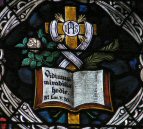 The Gospel:
The Liturgy of the Word is completed
by the reading of the Gospel. Before its reading, the members of the
assembly trace the sign of the cross upon the forehead to indicate their mental
acceptance of the Truth, on the lips to indicate their readiness to announce it,
and over the heart to indicate their sincere desire to accept it into their
lives. The "Good News" of the Gospel tells that God's kingdom has come for
all to hear, accept, and announce to the world for its salvation. It
is God who is speaking to us. Christ comes to teach us by the example of
His life and by His own words.
The Gospel:
The Liturgy of the Word is completed
by the reading of the Gospel. Before its reading, the members of the
assembly trace the sign of the cross upon the forehead to indicate their mental
acceptance of the Truth, on the lips to indicate their readiness to announce it,
and over the heart to indicate their sincere desire to accept it into their
lives. The "Good News" of the Gospel tells that God's kingdom has come for
all to hear, accept, and announce to the world for its salvation. It
is God who is speaking to us. Christ comes to teach us by the example of
His life and by His own words.
Priest: Cleanse my heart and my lips, almighty God, that I may worthily proclaim your
holy Gospel. Through the words of the Gospel may our sins be wiped away.
Priest: The Lord be with you.
All: And
also with you.
Priest/Deacon: A
reading from the holy Gospel according
to John.
All: Glory
to you, Lord.
The Gospel: John 14:1-12
John wrote to show that Christ was
the Messiah, the Divine Son of God.
 Jesus said to his
disciples: “Do not let your hearts be troubled. You have faith in God; have
faith also in me. In my Father’s house there are many dwelling places. If
there were not, would I have told you that I am going to prepare a place for
you? And if I go and prepare a place for you, I will come back again and take
you to myself, so that where I am you also may be. Where I am going you know
the way.” Thomas said to him, “Master, we do not know where you are going; how
can we know the way?” Jesus said to him, “I am the way and the truth and the
life. No one comes to the Father except through me. If know me, then you will
also know my Father. From now on you do know him and have seen him.” Philip
said to him, “Master, show us the Father, and that will be enough for us,.”
Jesus said to him, “Have I been with you for so long a time and you still do not
know me, Philip? Whoever has seen me has seen the Father. How can you say,
‘Show us the Father’? Do you not believe that I am in the Father and the Father
is in me? The words that I speak to you I do not speak on my own. The Father
who dwells in me is doing his works. Believe me that I am in the Father and the
Father is in me, or else, believe because of the works themselves. Amen, amen,
I say to you, whoever believes in me will do the works that I do, and will do
greater ones than these, because I am going to the Father.”
Jesus said to his
disciples: “Do not let your hearts be troubled. You have faith in God; have
faith also in me. In my Father’s house there are many dwelling places. If
there were not, would I have told you that I am going to prepare a place for
you? And if I go and prepare a place for you, I will come back again and take
you to myself, so that where I am you also may be. Where I am going you know
the way.” Thomas said to him, “Master, we do not know where you are going; how
can we know the way?” Jesus said to him, “I am the way and the truth and the
life. No one comes to the Father except through me. If know me, then you will
also know my Father. From now on you do know him and have seen him.” Philip
said to him, “Master, show us the Father, and that will be enough for us,.”
Jesus said to him, “Have I been with you for so long a time and you still do not
know me, Philip? Whoever has seen me has seen the Father. How can you say,
‘Show us the Father’? Do you not believe that I am in the Father and the Father
is in me? The words that I speak to you I do not speak on my own. The Father
who dwells in me is doing his works. Believe me that I am in the Father and the
Father is in me, or else, believe because of the works themselves. Amen, amen,
I say to you, whoever believes in me will do the works that I do, and will do
greater ones than these, because I am going to the Father.”
Priest/Deacon: The Gospel of the Lord.
All: Praise
to you, Lord Jesus Christ.
The Priest's Sermon:
The priest develops, explains, and comments upon the Master's words,
so our minds may be
enlightened, and our
hearts enriched.
(A priestly reflection upon this Gospel)
General Intercessions: We pray for the needs of the pope, civic leaders, our own needs, those of others, the sick, the dying, those who have died, the church, and the world. The response of all to each intercession: Lord, hear our prayer.
All: Lord,
hear our prayer.
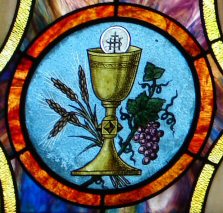 The Liturgy of the Eucharist
The Liturgy of the Eucharist
Gifts of bread and wine symbolizing ourselves are presented to the priest who will offer them to God the Father. Through the Holy Spirit, they will become the Body and Blood of Jesus Christ whom we receive in Holy Communion. Jesus unites Himself with us for our spiritual nourishment and strength. Today, when individuals do not present their own personal offerings of bread and wine, the monetary contribution symbolizes the material of their united sacrifice.
Preparation of the Bread and Wine:
Priest: Blessed are you, Lord, God of all creation, for through your goodness we have
received the bread we offer you;
fruit of the earth and work of human hands, it will become for us the bread of life.
All:
Blessed be God for ever.
Priest: By the mystery of this water and wine may we come to
share in the divinity of Christ, who humbled himself to share
in our humanity.
Priest: Blessed are you, Lord God of all creation, for through your goodness we have
received the wine we offer you; fruit
of the vine and work of human hands it will become our spiritual drink.
All: Blessed be God for ever.
Priest: Lord God, we ask you to receive us and be pleased with the sacrifice we offer you with humble and contrite hearts.
The Priest's Hands are Washed: This act was traditional necessary because the priest handled the various gifts presented by the people. Now, the cleansing act using water reminds the priest and ourselves of the need to cleanse not only the hands but the soul. Soon, the priest's hands will hold the actual body of Christ, and we will become His dwelling place.
Priest: Lord,
wash away my iniquity; cleanse me from my sin.
Pray, brethren, that
my sacrifice and yours may be acceptable to God, the almighty Father.
All: May the Lord accept the sacrifice at your hands, for the praise and glory of his
name, for our good, and the good of
all his holy Church.
Prayer over the Gifts:
Speaking in our name, the priest asks
the Father to accept the gifts we offer through him.
Priest: Lord God, by this holy exchange of gifts you share with us your divine life. Grant that everything we do may be directed by the knowledge of your truth. We ask this in the name of Jesus the Lord.
Eucharistic Prayer: (Number Four: The priest may select from several forms).
Priest: The Lord be with you.
All: And also with you.
Priest: Lift up your hearts.
All: We lift them up to the Lord.
Priest: Let us give thanks to the Lord, our God.
All: It is right to
give him thanks and praise.
Preface Prayer:
Priest: Father, all-powerful and ever-living God, we do well always and everywhere to give you thanks through Jesus Christ our Lord. We praise you with greater joy than ever on this Easter day when Christ became our paschal sacrifice. As he offered his body on the cross, his perfect sacrifice fulfilled all others. As he gave himself into your hands for our salvation, he showed himself to be the priest, the altar, and the lamb of sacrifice. The joy of the resurrection renews the whole world, while the choirs of heaven sing for ever to your glory:
Acclamation:
Priest and All: Holy, Holy, Holy Lord, God of power and might, Heaven and earth are full of your glory. Hosanna in the highest. Blessed is he who comes in the name of the Lord. Hosanna in the highest.
Priest: Father, we acknowledge your greatness: all your actions show your wisdom and love. You formed man in your own likeness and set him over the whole world to serve you, his creator, and to rule over all creatures. Even when he disobeyed you and lost your friendship you did not abandon him to the power of death, but helped all men to seek and find you. Again and again you offered a covenant to man, and through the prophets taught him to hope for salvation. Father, you so loved the world that in the fullness of time you sent your only Son to be our Savior.
He was conceived through the power of the Holy Spirit, and born of the Virgin Mary, a man like us in all things but sin. To the poor he proclaimed the good news of salvation, to prisoners, freedom, and to those in sorrow, joy. In fulfillment of your will he gave himself up to death; but by rising from the dead, he destroyed death and restored life. And that we might live no longer for ourselves but for him, he sent the Holy Spirit from you, Father, as his first gift to those who believe, to complete his work on earth and bring us the fullness of grace.
Priest: Father, may this Holy Spirit sanctify these offerings. Let them become the body and blood of Jesus Christ our Lord as we celebrate the great mystery which he left us as an everlasting covenant.
He always loved those who
were his own in the world. When the time came for him to be glorified by
you, his heavenly Father, he showed the depth of his love.
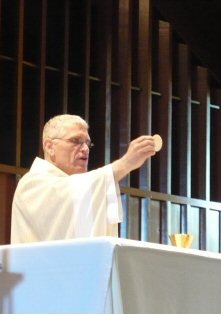 The priest repeats the words which
Christ used at his Last Supper when He changed the bread into His Body and the
wine into His Blood. His Body and Blood are truly present but under the
appearance of bread and wine. The death of Christ is prolonged in each of
those who receive Him worthily. We apply His death to ourselves so that we
may share His glory. This moment is the most solemn on earth because it is
Divine act which enables us to apply to ourselves the Cross which Christ
willingly took upon Himself.
The priest repeats the words which
Christ used at his Last Supper when He changed the bread into His Body and the
wine into His Blood. His Body and Blood are truly present but under the
appearance of bread and wine. The death of Christ is prolonged in each of
those who receive Him worthily. We apply His death to ourselves so that we
may share His glory. This moment is the most solemn on earth because it is
Divine act which enables us to apply to ourselves the Cross which Christ
willingly took upon Himself.
We are called to die to sin and
lift our very selves to God so that we become changed; to do as God would have
us do, to become what God would have us become. Our own little cross can
lift us into union with Christ's Cross so we may earn the joys of everlasting
happiness with God the Father.
The
Lord's Supper:
While they were at supper, he took bread,
said the blessing, broke the bread, and gave it to his disciples, saying:
Take this, all of
you and eat of it: for this is my Body which will be given up for you.
 In
the same way, he took the cup filled with wine. He gave you thanks, and
giving the cup to his disciples, and said:
In
the same way, he took the cup filled with wine. He gave you thanks, and
giving the cup to his disciples, and said:
Take this, all of you, and drink from it; for this is the chalice of my
Blood, the Blood of the new and eternal covenant; which will be poured out for you and for many for the
forgiveness of sins. Do this in memory of me.
Memorial Acclamation: (The priest may
select from several forms).
Priest:
Let us proclaim the mystery of faith.
Priest and All: When we eat this bread and drink this cup, we
proclaim your death, Lord Jesus, until you come in glory.
Memorial Prayer: (The priest may select from several forms).
Priest: Father, we now celebrate this memorial of our redemption. We recall Christ's death, his descent among the dead, his resurrection, and his ascension to your right hand; and, looking forward to his coming in glory, we offer you his body and blood, the acceptable sacrifice which brings salvation to the whole world.
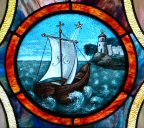 Lord, look upon this
sacrifice which you have given to your Church; and by your Holy Spirit, gather
all who share this one bread and one cup into the one body of Christ, a living
sacrifice of praise.
Lord, look upon this
sacrifice which you have given to your Church; and by your Holy Spirit, gather
all who share this one bread and one cup into the one body of Christ, a living
sacrifice of praise.
Lord, remember those for whom we offer this sacrifice, especially _____ our Pope, _____ our bishop, and bishops and clergy everywhere. Remember those who take part in this offering, those here present and all your people, and all who seek you with a sincere heart. Remember those who have died in the peace of Christ and all the dead whose faith is known to you alone. Father, in your mercy grant also to us, your children, to enter into our heavenly inheritance in the company of the Virgin Mary, the Mother of God, and your apostles and saints. Then, in your kingdom, freed from the corruption of sin and death, we shall sing your glory with every creature through Christ our Lord, through whom you give us everything that is good.
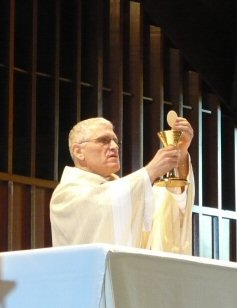 Doxology:
Doxology:
Prayer of Praise:
Through him, with him,
and in him, in the unity of the Holy Spirit, all glory and honor is yours,
almighty Father, for ever and ever. Amen.
All: Amen.
Communion Rite
In the Liturgy of the Eucharist, we symbolically offer ourselves to the Lord through the gifts of bread and wine. At the Consecration, we offer our very lives to be united the God the Father through the Cross of Christ. In Communion, we find that we have not died at all, but have come to life. We have surrendered ourselves to God through His Divine Son, Jesus Christ. In return become ennobled and enriched. We give up time and we get eternity, we give up our sin and we receive grace, we surrender our self-will and receive the strength of the Divine Will, we give up ourselves and we receive everything. For the Son of God says to us that unless we receive Him we shall not have Divine life in us. But it is not really we who receive Christ as it is Christ who receives us, bringing us into Himself.
God makes His Cross the very means of our salvation and our life. While we have crucified Him, His eternal love cannot be extinguished. Christ willed to give us the very life we crucified in our Redemption, the Consecration of Holy Thursday into Communion, His death into our everlasting life.
The Lord's Prayer:
Priest: Let us ask our Father to forgive our sins and to bring
us to forgive those who sin against us.
Priest and
All: Our
Father, who art in heaven, hallowed be they name; Thy kingdom come; Thy will be
done on earth as it is in
heaven. Give us this
day our daily bread; and forgive us our trespasses as we forgive those who
trespass against us; and lead us not into temptation, but deliver us from evil.
All: For the kingdom, the power and
the glory are yours, now and for ever.
Prayer for Peace:
Priest and All: Lamb of God, you take away the sins of the
world, have mercy on us.
Lamb of God, you take away the sins of the world, have mercy on us.
Lamb
of God, you take away the sins of the world, grant us peace.
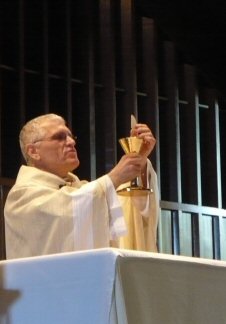 Communion of
the Priest:
Communion of
the Priest:
Priest: May this mingling of the body and blood
of our Lord Jesus Christ bring eternal life to us who receive it.
Priestly Preparation: Lord Jesus Christ, Son of the living God, who by the will of the Father and the work of the Holy Spirit, through your death gave life to the world. By your holy body and blood free me from all my sins, and from every evil. Keep me faithful to your teaching, and never let me be parted from you.
Priest: This is the Lamb of God who takes away the sins of the world. Happy are
those who are called to his supper.
Priest and All: Lord,
I am not worthy to receive you, but only say the word and I shall be healed.
Priest: May the Body of Christ keep me safe for eternal life.
May the Blood of Christ keep me safe for eternal life.
Communion Antiphon:
Communion Song: John 15:5
I am the vine and you are the branches, says the Lord; he who lives in me, and I in him, will bear much fruit, alleluia.
Communion of the Faithful:
Priest: The Body of Christ.
All: Amen.
Priest:
The Blood of Christ.
All: Amen.
Cleansing of the Vessels:
Priest: Lord,
may I receive these gifts in purity of heart. May they bring me healing
and strength, now and for ever.
Prayer after Communion:
Priest: Let us pray.
Priest: Merciful Father, may these mysteries give us new
purpose and bring us to a new life in you. Grant this through Christ our
Lord.
Concluding Rite
Priest: The Lord be with you.
All: And also with you.
Dismissal Prayer: (The priest may select
from several forms)
Priest: Bow your heads and pray for God's blessing.
Lord, help your people to seek you with all their hearts and to deserve
what you promise. Grant this through Christ our Lord.
All:
Amen.
Priest: May almighty God bless you, the Father, and the Son, and
the Holy Spirit.
All:
Amen.
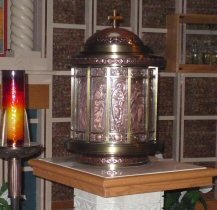 O my Jesus, forgive us our sins.
O my Jesus, forgive us our sins.
Save us from the fires of hell.
Lead all souls to heaven,
especially those in most need of your mercy.
www.Divinemasterplanforlife.com
www.Saintsnheaven.com
Top
Home Page
Liturgical
Cycles A 10-11